By Simon McKenzie (Mac) and Jane Sassienie
This is the first article in Social Space’s three-part series on Societal Leadership. Read Part 2 and Part 3.
Humanity is facing some profound challenges of its time. Can we produce enough nutritious food? Do we have enough clean water, fresh air and sustainable energy? Can our complex global economy ever be just and fair for all? Can we exist without warming our environment and triggering irreversible changes to our planet?
To leave a better world for generations to come, we need more leaders that unite people and organisations towards a higher purpose. Societal leaders are ones that exist not only for their organisations, divisions, teams or themselves, but for all the world as well.
In our work at Bridge Partnership and the Bridge Institute, we support senior leaders in businesses, governments and not-for-profits to create a fairer, more prosperous, more joyous and safer world. We have worked with many role models of societal leadership, and studied exemplars throughout history, and have found that such individuals—Rosa Parks, Nelson Mandela, Lee Kuan Yew, Christiana Figueres, Mahatma Gandhi, Martin Luther King, Paul Polman, Dr Sunitha Krishnan and Dr Praveen Kumar—have lived with a set of common belief systems and capacities, alongside a profound sense of purpose.
The Bridge Societal Leadership Model outlines these beliefs and capacities.
Bridge Societal Leadership Model
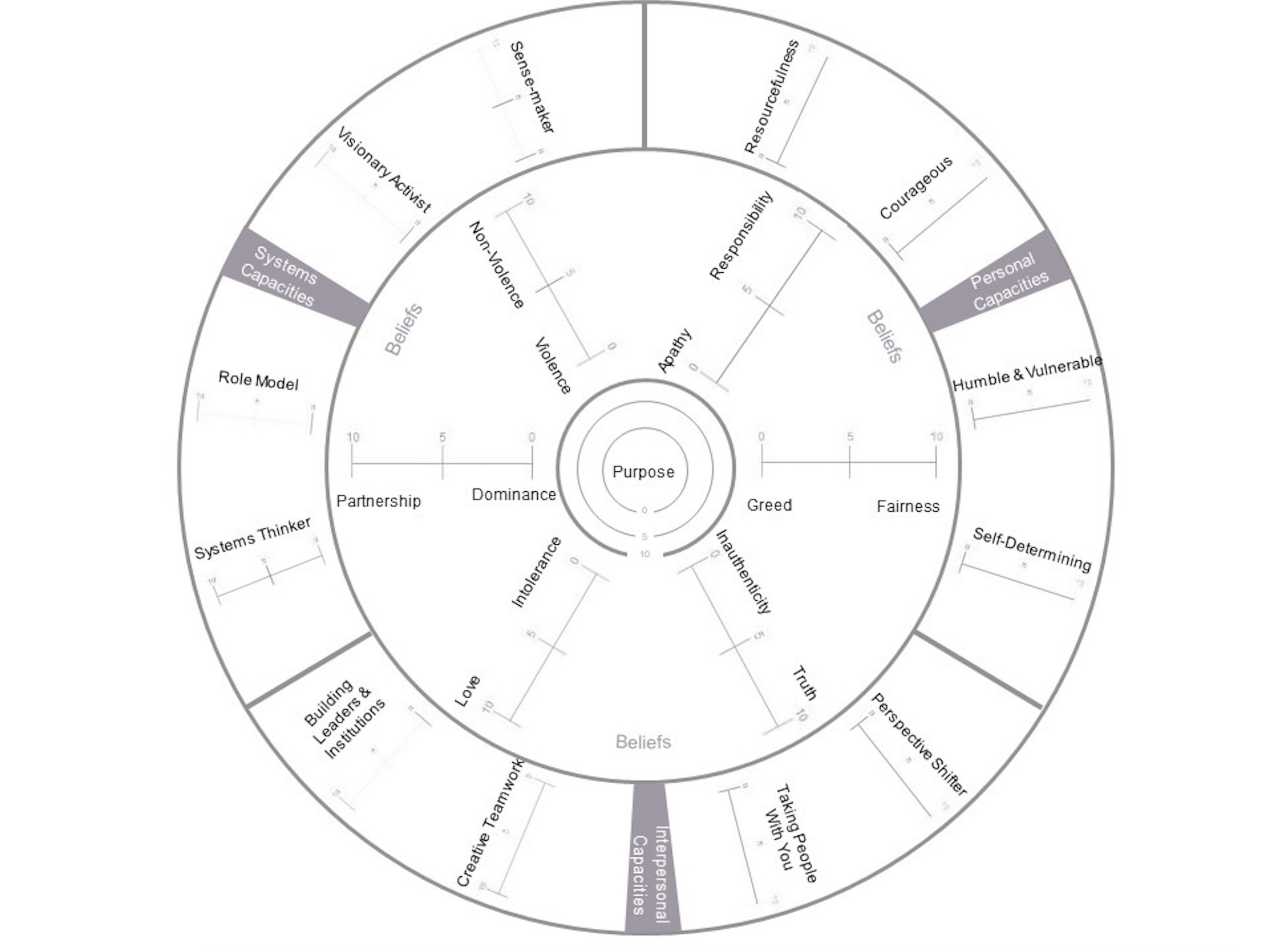
Source: Bridge Partnership and Bridge Institute
Beliefs and Capacities
As human beings, our beliefs constitute the lens through which we see and judge the world and ourselves. Beliefs can be conscious or unconscious. However, when we make a decision through an unconscious belief, we may not always challenge or query where the belief originated or whether it serves us well.
Examples of beliefs can include notions such as:
- A person can “own” land
- People who are paid less are worth less
- Animals deserve similar or equal rights to human beings
- Human beings are entitled to make use of animals for the purposes of advancing civilisation
- Certain criminals deserve the death penalty because they are too dangerous or deserving of punishment to be rehabilitated or kept incarcerated
- Governments should not be vested with the authority to determine who has a right to live or die
- Caring and caregiving is of little value; therefore the work of many women and some men is of low value
Our capacities consist of our unique abilities and powers. Some individuals may be exceptional in nurturing others; others in inspiring and influencing other people to follow them. There are those who are able to take action in the midst of fear; and there are those with a distinctive capability to view the world in ways others cannot.
The Foundation: Purpose
Societal leaders develop over time a deep sense of personal purpose. This purpose stands for the greater good of others—it unleashes energy and courage. With a deep sense of personal purpose, societal leaders recognise that it is their role and duty to step forward, and believe they are worthy and capable of changing the world.
As Patanjali, the author of the Yoga Sutra, said, "When you are inspired by some great purpose, some extraordinary project, all your thoughts break their bonds. Your mind transcends limitations, your consciousness expands in every direction, and you find yourself in a new, great and wonderful world. Dormant forces, faculties and talents become alive, and you discover yourself to be a greater person by far than you ever dreamed yourself to be.”
All those who have changed the world for the better have discovered their personal purpose over time. Many start without a clear sense of personal purpose, but it certainly becomes clearer over time, when the leader is on their journey.
The Societal Leader’s Belief
#1 Belief in Non-Violence
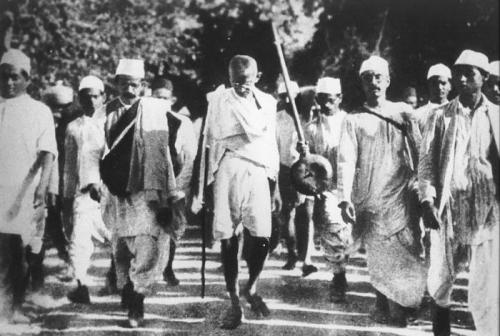
Image via Wikimedia Commons (public domain)
“I claim to be no more than the average person with less than average ability. I have not the shadow of a doubt that any man or woman can achieve what I have, if he or she would make the same effort and cultivate the same hope and faith.”—Mahatma Gandhi
Very often, inflicting violence only multiplies the existence of violence. On the other hand, non-violence can bring about a transformation and change of heart. Embracing non-violence is not just about refraining from physical violence; societal leaders do not endorse non-physical acts of violence, too—these may include sabotaging or speaking ill of others, verbal abuse, being vengeful, and walking away from injustice.
As part of Mahatma Gandhi’s protest against British rule, he chose a non-violent raid of the Dharasana Salt Works in Gujarat. Hundreds of civilians attempted to walk peacefully into the factory despite being beaten by soldiers under British command at Dharasana.
American journalist Webb Miller, an eyewitness to the beatings, wrote: “Not one of the marchers even raised an arm to fend off the blows. They went down like ten-pins. From where I stood, I heard the sickening whacks of the clubs on unprotected skulls. The waiting crowd of watchers groaned and sucked in their breaths in sympathetic pain at every blow.”
Miller’s story appeared in 1,350 newspapers throughout the world, shifting world opinion. Vithalbhai Patel, former Speaker of the Assembly, watched the massacre and remarked: “All hope of reconciling India with the British Empire is lost forever.” This incident was seen by many British and Indians as the event that terminally damaged the legitimacy of the British.
#2 Belief in Partnership

Image courtesy of Paul Polman
“True leadership is putting the interests of others ahead of your own, knowing that by doing so you will be better off yourself as well.”—Paul Polman
In the book, The Real Wealth of Nations, author Dr Riane Eisler discusses how social movements over the last 300 years have challenged the entrenched traditions of domination. Movements championing women’s rights, civil rights, anti-colonialism and economic justice, for instance, have respectively led to positive social change.
However, in spite of this progress, Eisler argues that present-day societies appear to be reversing towards a place of domination. With the rise of fundamentalism and nationalism, we are living in times where superior–inferior relations are reinforced, and the world is increasingly shaping into an environment where one either controls or is controlled. As a consequence, not enough investments are channelled towards safeguarding the well-being of communities or the planet. She concludes with an important call to action—for societies to move away from a system of dominance and instead towards an economic model of partnership, which values what is genuinely valuable to humans and the planet.
Unilever Lifebuoy’s story is an inspiring example of this mindset.
Every year, 2.1 million children die from deadly yet preventable diseases like diarrhoea. Under the guidance and vision of Paul Polman, Unilever’s former CEO, the Lifebuoy team defined their purpose as: “Help a child reach 5.” With this profoundly worthy purpose, they partnered with schools, hospitals, governments and civil society to drive awareness of the importance of clean hands. This resulted in a significant shift in behaviour in the regions they were active in. When the Bridge Partnership team asked the leaders of Lifebuoy what inspired this partnership approach, they credited Polman for helping them see their higher purpose and recognising the obvious power of partnership.
#3 Belief in Love

Image via Wikimedia Commons (CC BY-SA 4.0)
“Do ordinary things with extraordinary love.”—Mother Teresa
Societal leaders approach the world from a place of love, not intolerance. They embrace the notions embodied in the words of Wes Angelozzi: “Go and love someone exactly as they are. And then watch how quickly they transform into the greatest, truest version of themselves. When one feels seen and appreciated in their own essence, one is instantly empowered.”
Agnes Gonxha Bojaxhiu, commonly known as Mother Teresa, was born on 26 August 1910 in Macedonia. She realised her purpose—“I heard the call to give up all and follow Christ into the slums to serve him among the poorest of the poor”—at the age of 38, while travelling though India. Within two years, she had founded the Missionaries of Charity, dedicated to the care of “the hungry, the naked, the homeless, the crippled, the blind, the lepers, all those people who feel unwanted, unloved, uncared for throughout society, people that have become a burden to the society and are shunned by everyone.”
To this day, Mother Teresa continues to inspire people all over the world with her love and care for the poor.
#4 Belief in the Power of the Truth

Image via Wikimedia Commons (public domain)
“Devotion to this Truth is the sole justification for our existence. All our activities should be centred in Truth. Truth should be the very breath of our life.”—Gandhi
In some parts of the world, there is an emergence of “post-truth politics”, in which politicians lie and actually get away with it. It is based on the assumption that facts no longer matter, and that people can be persuaded to vote for a cause on these lies. Post-truth politics is both dangerous and corrosive.
Societal leaders, on the other hand, see truth as the substance of all morality. Without truth, they believe, it would be impossible to navigate principles and the rules of life.
Gandhi once shared this story about truth.
“There is an incident which occurred at the examination during my first year at the high school and which is worth recording. Mr Giles, the Educational Inspector, had come on a visit of inspection. He had set us five words to write as a spelling exercise. One of the words was ‘kettle’. I had mis-spelt it. The teacher tried to prompt me with the point of his boot, but I would not be prompted. It was beyond me to see that he wanted me to copy the spelling from my neighbour’s slate, for I had thought that the teacher was there to supervise us against copying. The result was that all the boys, except myself, were found to have spelt every word correctly. Only I had been stupid. The teacher tried later to bring this stupidity home to me but without effect. I never could learn the art of ‘copying’.”
In an age of post-truth politics, the need has never been greater for societal leaders, and their commitment to embrace the truth.
#5 Belief in Fairness
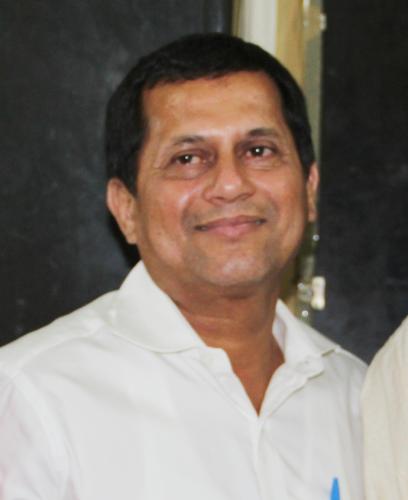
Image via Wikimedia Commons (CC BY-SA 3.0)
“My only goal is to eradicate poverty and help as many children as possible.”—Dr. Achyuta Samanta
All societal leaders promote fairness. Fairness enables equality, justice, respect and hope. Some societal leaders embrace fairness through a simple way of living—they prefer to serve their cause without the physical or mental clutter of material goods and possessions.
As an example of this, Dr Achyuta Samanta is one such individual. Born in Odisha in 1965 and losing his father when he was only four, Samanta grew up in desperate poverty with his widowed mother and seven siblings. The experience was so impactful on him that he later resolved to dedicate his life to lifting others out of poverty.
However, having only 5,000 Rupees (US$70) to his name and living in a rented two-bedroom apartment did not stop Samanta from his determination to transform the education landscape of his region. In 1993, he started a free residential school for tribal children which, within 25 years, had grown to 27,000 students. He also started Kalinga Institute of Industrial Technology (or KIIT University), which offers over 27,000 students across 40 countries the opportunity to pursue degrees in engineering, medicine and law.
Today, Samanta still owns no personal property and has not married. His philosophy and embracing of fairness has become a benchmark for others to follow.
#6 Belief in Wider Responsibility
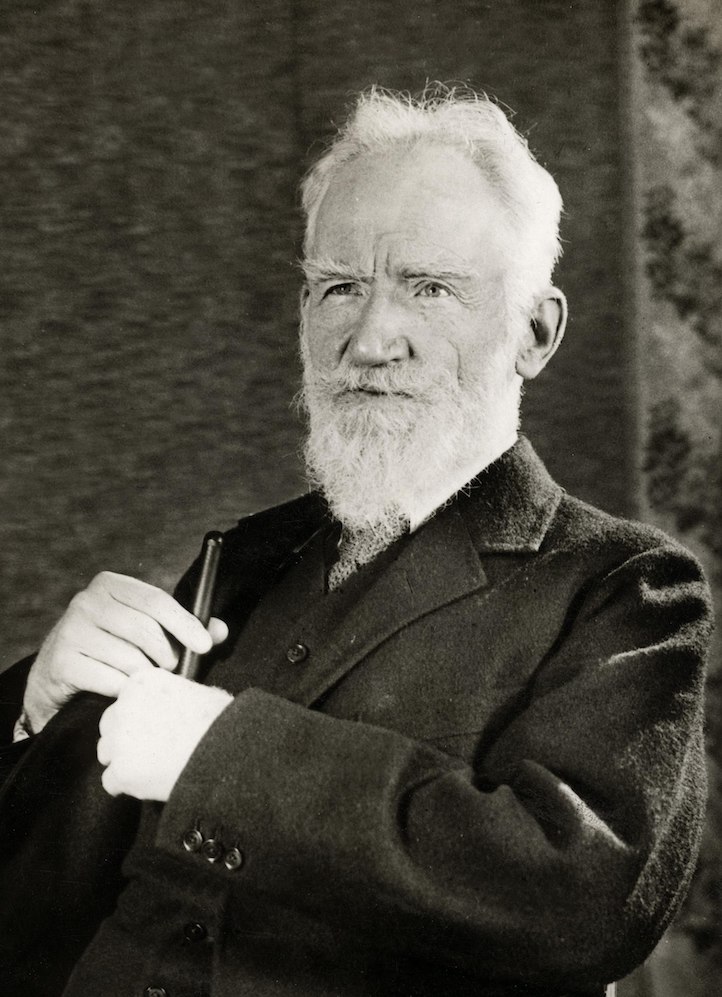
Image via Wikimedia Commons (public domain)
“Life is no brief candle to me; it is a sort of splendid torch which I’ve got hold of for the moment and I want to make it burn as brightly as possible before handing it on to future generations.” —George Bernard Shaw
A societal leader’s attention is the entire world—not just on themselves, their families, the teams or their organisations. This stems from their wholehearted belief that they are responsible for all of society.
Such a belief is beautifully captured in the words of George Bernard Shaw: “I am of the opinion that my life belongs to the whole community and as long as I live, it is my privilege to do for it whatever I can.”
This article has set out some core beliefs of societal leaders. It is the first in a three-part series on societal leadership. Stay tuned for forthcoming essays, respectively on the capacities of societal leaders and ways one can enhance their ability to be a societal leader. We hope readers consider how these might take them on a path towards leading impact.
| Simon McKenzie (Mac) is a director of Bridge Partnership and one of the co-founders of the Bridge Institute. Based in Singapore, Mac’s expertise is in leading societal programmes on behalf of governments and corporates. The programmes bring the highest levels of government, business and civil society together to solve pressing societal challenges. These pioneering programmes are now called SDG17, after the Sustainable Development Goal 17 Partnerships, and they apply leadership, strategy, systems thinking, design thinking and policy tools to support breakthroughs in thinking and action. Mac can be reached at mac@bridge-partnership.com | |
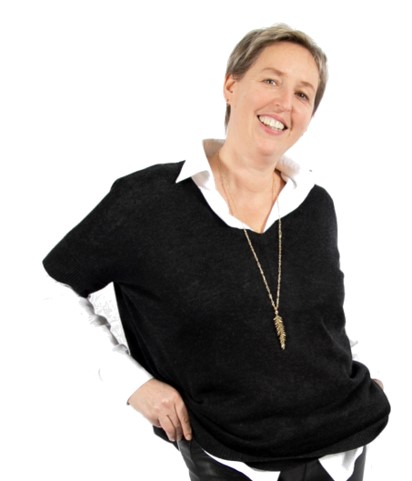 |
Jane Sassienie is a director of Bridge Partnership and a co-founder of the Bridge Institute. She has been working in the field of leadership and system evolution for more than 25 years, and in Bridge for over 20 years. Based in London, Jane’s expertise is in understanding how to equip leaders, organisations and social systems with the capabilities they need to sustain transformation. She has designed the programmes for Bridge and the Bridge Institute that bring together government, business and civil society in partnership to tackle some of the most difficult societal challenges. Jane can be reached at Jane.Sassienie@bridge-partnership.com |








Comments
- Reply
Permalink- Reply
Permalink